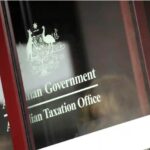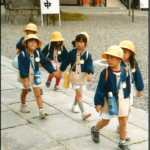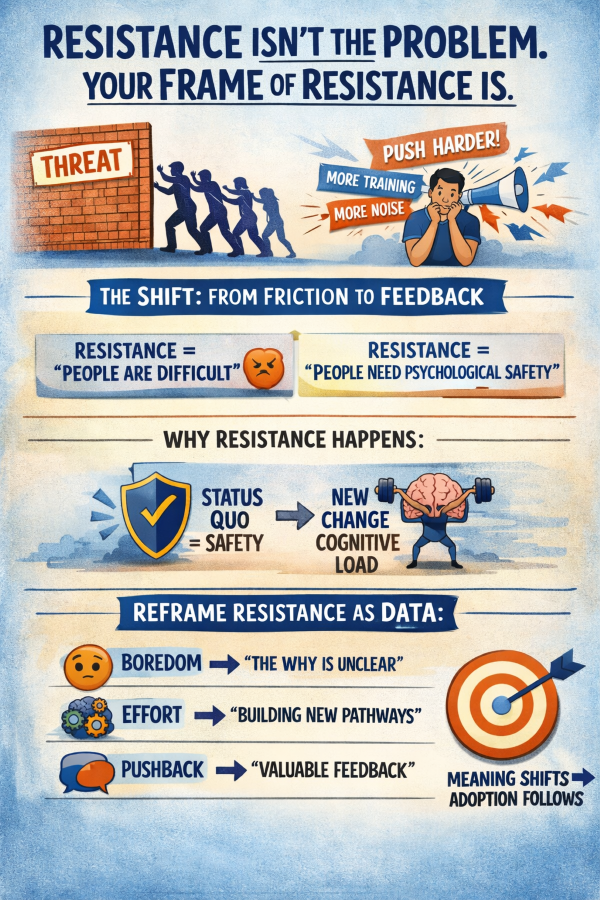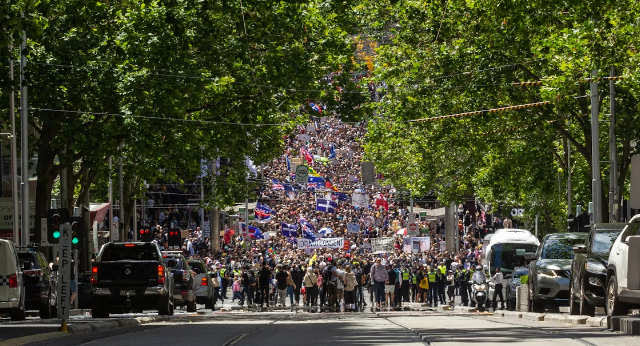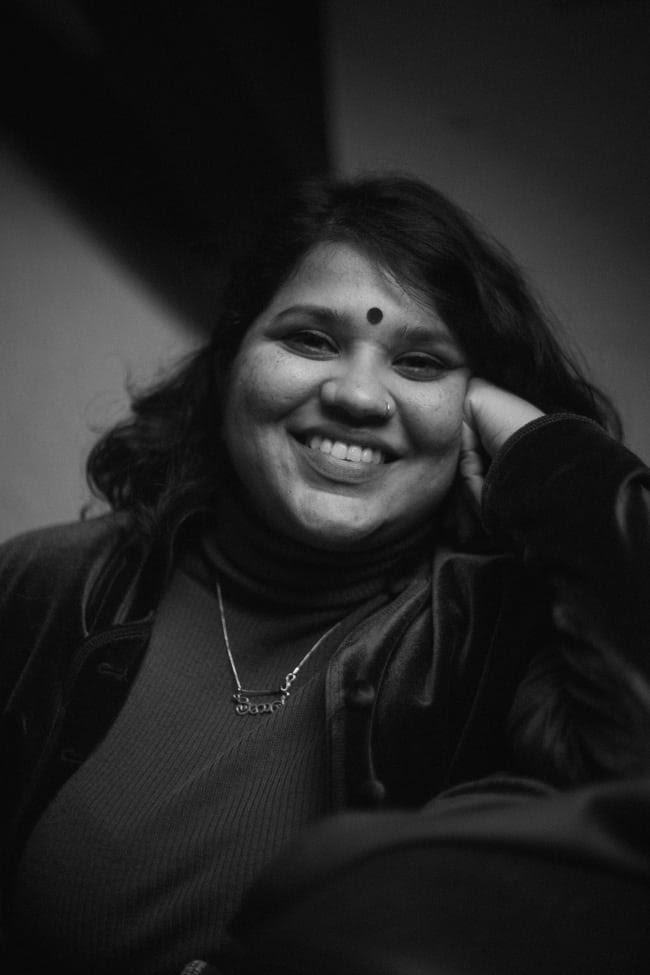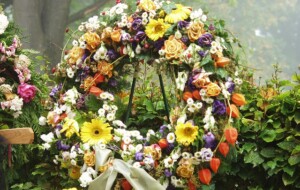Exploited in a crisis: why are Sri Lankans getting on boats bound for Australia?
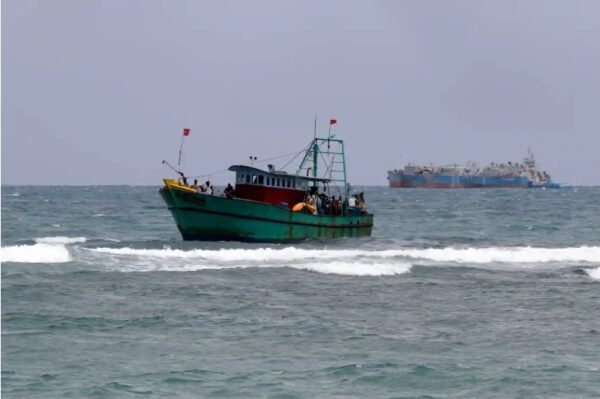
Poor and vulnerable people fleeing Sri Lanka are being met by Australian boat turnbacks and ‘enhanced assessments’ that may breach international law
Get our free news app; get our morning email briefing
“I thought if I travelled to Australia, I could earn more money and lead a better life,” Jayan* says from his modest home, in a coastal village in the north of Sri Lanka.
A fisherman by trade and a member of Sri Lanka’s Tamil ethnic minority, Jayan is familiar with boats and was asked to fix the ageing vessel that was to take him to Australia, alongside a desperate handful of men, women and children.
The boat made it to Australia, but he was, he says, swiftly returned to Sri Lanka. A handful of questions and he found himself put onto a plane, and flown back to where he started, now facing charges.
“Since the economic situation in the country has exacerbated, I have been called to return as a boat keeper. I tell people not to travel on the boat because Australia does not accept asylum seekers.”
Human trafficking rings are exploiting Sri Lanka’s economic crisis to coerce some of the country’s poorest and most marginalised onto boats out of the country.
But across the Indian Ocean, and against the backdrop of civil unrest and forecast widespread hunger in Sri Lanka, there are persistent concerns that asylum seekers arriving by boat in Australia are not having their claims for protection properly assessed, and that some may be forcibly and unlawfully returned to harm.
The surge in the number of boats leaving Sri Lanka loaded with passengers began before Australia’s election and change of government in May, as concurrent economic, social and political crises have brought the country to the brink of collapse. And still the boats come, despite interceptions: the most recent boat was stopped on Thursday night in seas south of the Sri Lankan capital, bound for Australia, with 35 people on board, including six children.
As a Tamil, Jayan says the challenges he faced in Sri Lanka remain, heightened by the country’s worsening economic and political crises. But there is, he says, a “mafia” in operation, exploiting the emergency, promising safe passage overseas, and demanding up to 900,000 rupees (A$3,500) for a place on a boat.
“Local people talk about the change in the government this year and they ask me to join in as a boat keeper. Some people say that a successful landing in Australia is possible, but I refuse to get on the boat because based on my experience the people are returned back.”
A senior police officer in the Tamil-majority Batticaloa region of Sri Lanka’s east told Guardian Australia those boarding boats were mainly Tamils, and were being tricked by smuggling rackets seeking to exploit Sri Lanka’s worsening economic woes – and impending hunger crisis – for profit.
“They get on the boats because they cannot find jobs and have money problems in the country. They leave to make money,” the officer says, speaking on condition of anonymity.
“They [passengers on board the boats] sell all their gold and objects inside the house just to get onto the boats. They have no clue about the change in government or the politics there.”
Others argue those boarding boats are coerced by a complex set of factors.
“People are suffering right now because of this economic crisis,” human rights lawyer and Sri Lanka’s former human rights commissioner Ambika Satkunanathan says.
“For instance, for Tamils in the north and east of the country, the sense of insecurity that already existed – particularly after this president returned to power – is exacerbated by the current situation.”
Satkunanathan says there appears to be an “industry” around irregular migration, run by cartels promising passage to Canada [by plane] or to Australia via boats, which is exploiting people in Sri Lanka who are already economically vulnerable or facing systemic discrimination and oppression.
Since May, the Sri Lankan navy has intercepted at least 10 boats at sea, carrying 353 men, women and children: the youngest passenger was a month-old baby.
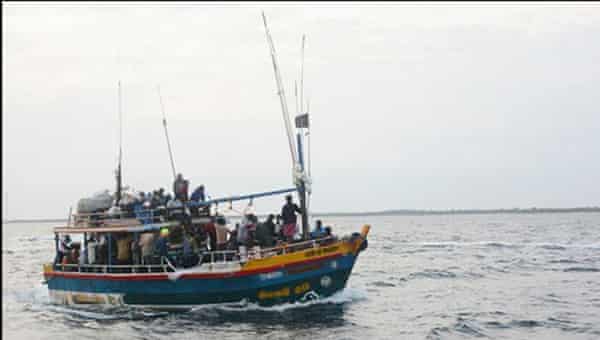
A further 53 people have been arrested on land, suspected of being about to board a boat.
But at least three boats have reached Australian waters between 24 May and 10 June, reportedly carrying 79 asylum seekers.
Those passengers had their claims for protection assessed by Australian authorities at sea – a controversial practice criticised as potentially unlawful – before being forcibly returned to Sri Lanka where they have been arrested and jailed.
Australia has committed $50m in aid funding to assist Sri Lanka, including $22m to the World Food Program. But it has also announced this week it would fund more than 4,000 GPS trackers to be put into Sri Lankan fishing boats – partially to surveil boats that might attempt to reach Australia.
The prime minister, Anthony Albanese, said Australia’s boat turnback policy had not changed under his government: “People who arrive by boat will not be settled here.”
“We will be strong on borders without being weak on humanity – but we will be strong when it comes to our borders,” he said.
Exploiting a crisis
Sri Lanka is in the grip of an economic crisis that has fuelled widespread social and political chaos. The country has defaulted on more than $7bn in debts, its rupee has plummeted in value and inflation has risen beyond 40%.
Chronic shortages of fuel, kerosene, cooking gas and medication have sparked protests. The state has responded violently through the use of teargas, water cannons and rubber bullets.
Other nations have pledged to help, with commitments of aid money, fuel and food. Sri Lanka’s new prime minister is trying to negotiate a bailout package with the International Monetary Fund.
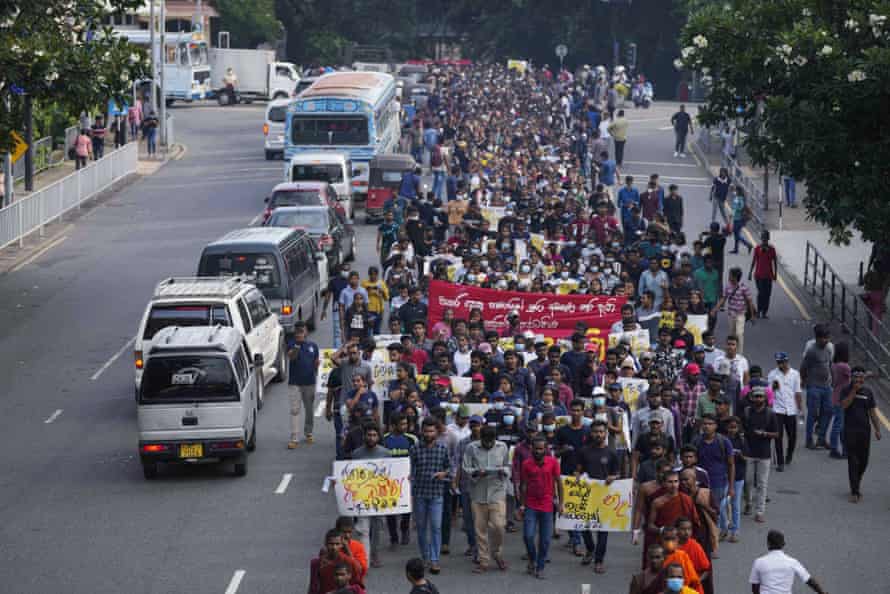
The Sri Lankan economic crisis has triggered protests demanding the president resign amid spiralling food, fuel and medicine costs. Photograph: Eranga Jayawardena/AP
But the human cost is acute. Last month, a baby died in the highlands town of Haldummulla after she fell ill at home; her parents were unable to source any petrol to rush her to hospital.
And the situation will worsen before it improves; Sri Lankans are bracing for widespread hunger across the country. Fertiliser is scarce, and many farmers have abandoned crops. Fishermen can’t find fuel to put their boats to sea, so nothing is caught.
The senior police source says those who have been caught trying to leave Sri Lanka by boat are some of the poorest people in the country, from Tamil-majority areas previously ravaged by war such as Vavuniya, Killinochi, Mullaitivu and Trincomalee.
“These were very poor people. They could not pay upfront – they had paid 200,000 rupees or 300,000 rupees at first. They had loaned out their property to pay for these expenses.
“There was one couple who had been married for two months. They could not find the money so they had sold their brother’s motorbike and received 400,000 rupees from it for the journey.”
The fishing boats chartered for the voyage across the Indian Ocean are typically old, and barely seaworthy. One boat intercepted on 18 May sank as it was being towed back to Trincomalee.
A Sri Lankan navy spokesperson, Captain Indika da Silva, told the Sunday Observer human traffickers were exploiting the economic crisis.
“Time and again, the navy, along with other state agencies [have] warned the public against these human traffickers.”
‘Enhanced assessments’
A spike in boat arrivals has been argued by the opposition in Australia as being the result of the return of the Labor party to government, following the federal election on 21 May.
“The people smugglers know that the same people who are now in government made terrible decisions before, and that’s what they’re preying on,” the opposition leader, Peter Dutton, said.
But hundreds of Sri Lankans have boarded boats for southern India in recent weeks as well. Thousands more – those with means – have boarded planes seeking work overseas, in the Middle East in particular.
And the outflow of boats from Sri Lanka to Australia preceded the election.
While the 2013 implementation of hardline – and controversial – interception and boat turnback policies dramatically reduced the number of asylum seeker boats arriving in Australian waters, the flow of boats never “stopped”, despite the political rhetoric.
Australian Border Force figures show at least 38 boats – carrying 873 people seeking asylum, including 124 children – arrived in Australian waters or on Australian shores, but were then returned under Operation Sovereign Borders between its launch in late 2013 and the end of 2021, an average of a little over four boats a year.
The actual number is likely higher because of a 2013 decision by government not to release details of “on-water” matters. Some asylum seeker boats which arrived were not “counted” by the former government because they had arrived on the east coast of Australia.
Factors driving forced displacement and irregular migration are rarely singular, and are far more often multifaceted and intersectional.
More than a decade after the end of the bloody separatist civil war between the Sri Lankan military and the Tamil Tigers, Tamil-majority areas of Sri Lanka continue to face oppressive restrictions from state security services.
“Minorities face official discrimination as well as speech that incites violence, discrimination or hostility, which the authorities do little or nothing to discourage and sometimes appear to endorse,” Human Rights Watch told the UN’s Human Rights Committee in May.
“Security force abuses against people subject to arrest and detention have continued … and are often committed against members of the Tamil and Muslim communities.”
The economic crisis, and the hunger that flows from it, is felt most acutely by those already marginalised and potentially facing persecution.
Satkunanathan said those arrested trying to leave Sri Lanka should not be jailed or prosecuted.
“People in this situation should be treated as victims, not treated as offenders, they are already suffering, and they are being re-victimised.”
Australia’s Labor government has committed to continue the Coalition’s policies of boat turnbacks.
But there are serious concerns about what happens to asylum seekers who reach Australian waters, and whether the policy of “at-sea” protection assessments, boat turnbacks and immediate deportations is in breach of international law.
The “enhanced assessments” conducted at sea are reportedly often done by teleconference, on poor phone lines in noisy environments. Some can be as short as four questions: a person’s name, their country of origin, from where they had departed, and why they had left.
There are concerns this abbreviated assessment process could fail to protect those who have fled Sri Lanka because of persecution.
As long ago as 2014, after Australia returned 41 Sri Lankan asylum seekers intercepted at sea, the UNHCR said the process was unlawful under international law.
“UNHCR has previously made known its concerns to Australia about its enhanced screening procedures and their non-compliance with international law,” it said.
“UNHCR’s experience over the years with shipboard processing has generally not been positive. Such an environment would rarely afford an appropriate venue for a fair procedure.”
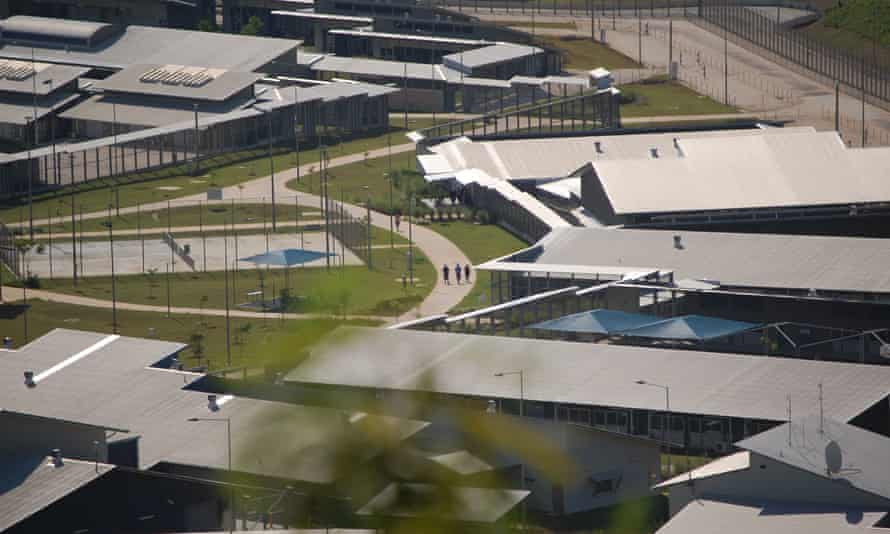
Sources on Christmas Island, where asylum seekers are brought in order to be flown out of Australia, say they have already been “screened out” by the time they set foot on Australian soil. They spend a bare few hours – often in the middle of the night – on Australian soil, without access to lawyers or to any appeal process.
Residents on Christmas Island say often the first they know of a boat arriving is the sound of a plane leaving the island’s airstrip at night.
Ian Rintoul from the Refugee Action Coalition said it “defied credibility” none of the recent arrivals in Australia had a claim that triggered Australia’s protection obligations.
He said the “screening out” interviews usually conducted by immigration officials in Canberra by satellite phone were a breach of asylum seekers’ human rights and Australia’s international obligations.
“They are called screening-out interviews for a reason. They are designed to reject people on the basis of few questions done in stressful conditions without access to legal advice or possibilities of appeal.
“They should have proper interviews. The Labor government knows that people being returned to Sri Lanka may well be being sent back to danger.”
* Jayan is a pseudonym. His name has been changed to protect him and his family.
… we have a small favour to ask. Millions are turning to the Guardian for open, independent, quality news every day, and readers in 180 countries around the world now support us financially.
We believe everyone deserves access to information that’s grounded in science and truth, and analysis rooted in authority and integrity. That’s why we made a different choice: to keep our reporting open for all readers, regardless of where they live or what they can afford to pay. This means more people can be better informed, united, and inspired to take meaningful action.
In these perilous times, a truth-seeking global news organisation like the Guardian is essential. We have no shareholders or billionaire owner, meaning our journalism is free from commercial and political influence – this makes us different. When it’s never been more important, our independence allows us to fearlessly investigate, challenge and expose those in power. Support the Guardian from as little as $1 – it only takes a minute. If you can, please consider supporting us with a regular amount each month. Thank you.



